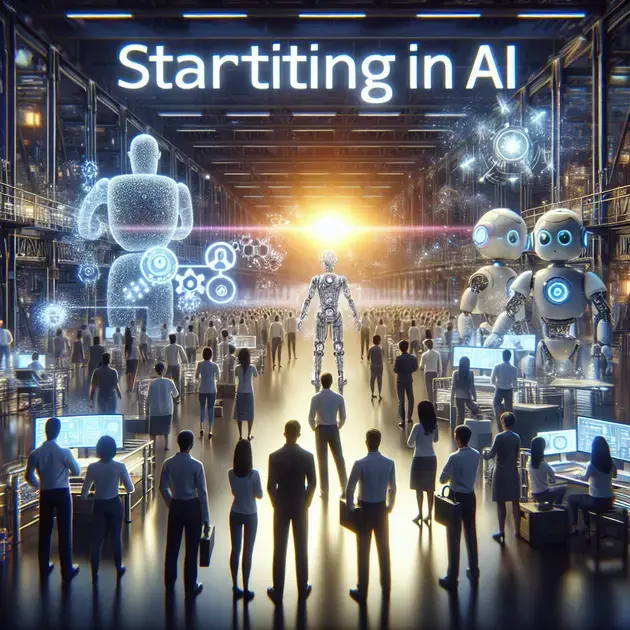
Are you interested in diving into the exciting world of Artificial Intelligence but not sure where to start? In this post, we will guide you on how to begin your journey in the field of AI.
Artificial Intelligence is revolutionizing industries across the globe, from healthcare to finance. Learning how to start in AI can open up a world of opportunities for your career and personal growth.
Exploring the Potential of Artificial Intelligence in Today’s World
Artificial Intelligence (AI) is revolutionizing various industries with its potential for automation, data analysis, and decision-making. One way to explore the potential of AI is by diving into the world of machine learning. Platforms like Coursera offer online courses on machine learning where individuals can learn the fundamentals and practical applications of AI algorithms. By enrolling in these courses, aspiring AI professionals can gain the knowledge and skills needed to develop AI solutions in different domains.
Another way to explore AI’s potential is through AI conferences and events. Platforms like Eventbrite provide a list of upcoming AI conferences where industry experts share insights, trends, and case studies on AI technologies. Attending these events can provide valuable networking opportunities and a deeper understanding of the latest advancements in the field of artificial intelligence.
Additionally, exploring AI research papers and publications on platforms like arXiv can offer profound insights into cutting-edge AI research projects. Reading and understanding these papers can help individuals stay updated on the latest AI developments and inspire them to innovate in the field.
Moreover, experimenting with AI-powered tools and platforms like IBM Watson, TensorFlow, or Microsoft Azure can provide hands-on experience in developing AI applications. These platforms offer tutorials, documentation, and community support to help individuals explore the full potential of AI technology in real-world projects.
By taking these steps, individuals can truly explore the vast potential of artificial intelligence in today’s world and gain the expertise needed to contribute to the advancement of AI technology.
Unlocking the Benefits of Embracing Artificial Intelligence
Embracing artificial intelligence can bring numerous benefits to businesses, including increased efficiency, cost savings, and improved decision-making. One way to unlock the benefits of AI is by implementing AI-powered chatbots on websites or customer service platforms. Tools like Chatfuel or Dialogflow provide easy-to-use interfaces for creating chatbots that can enhance customer support and automate repetitive tasks.
Another way to leverage AI is through predictive analytics tools like Google Analytics or IBM SPSS. These tools use AI algorithms to analyze data, predict trends, and make data-driven recommendations for businesses. By integrating these tools into their operations, companies can optimize their strategies and achieve better results.
Furthermore, utilizing AI in marketing automation platforms like HubSpot or Marketo can help businesses streamline their marketing efforts, personalize customer interactions, and improve marketing ROI. These platforms use AI algorithms to analyze customer behavior, segment audiences, and deliver targeted marketing campaigns that resonate with customers.
Moreover, adopting AI-powered cybersecurity solutions like Darktrace or Cylance can enhance data security and protect businesses from cyber threats. These solutions leverage AI to detect anomalies, identify potential security breaches, and respond to attacks in real-time, safeguarding sensitive information and maintaining business continuity.
By embracing artificial intelligence through these tools and platforms, businesses can unlock a wide range of benefits that drive growth, innovation, and competitive advantage in today’s digital landscape.
Navigating the Path to Success in the Field of Artificial Intelligence
Navigating the path to success in the field of artificial intelligence requires a strategic approach, continuous learning, and hands-on experience with AI technologies. One key step is to pursue a formal education in AI, such as a degree in artificial intelligence or machine learning from universities like Stanford or MIT. These programs provide a strong foundation in AI concepts, algorithms, and applications, preparing students for successful careers in the field.
Another essential aspect of succeeding in AI is gaining practical experience through internships or projects. Platforms like Kaggle or GitHub offer opportunities to work on AI projects, collaborate with industry professionals, and showcase one’s skills to potential employers. Building a portfolio of AI projects can demonstrate proficiency and expertise in AI technology, increasing career opportunities in the field.
Furthermore, staying updated on AI trends and advancements through resources like Towards Data Science or AI conferences can help professionals navigate the ever-evolving landscape of artificial intelligence. Continuous learning, networking, and knowledge-sharing with peers in the AI community can provide valuable insights and opportunities for growth in the field.
Additionally, pursuing certifications in AI from platforms like Udacity or Coursera can validate one’s expertise and skills in specific AI domains, such as deep learning or natural language processing. These certifications can enhance credibility, attract potential employers, and open doors to rewarding career opportunities in the field of artificial intelligence.
By following these steps and embracing a proactive approach to learning and career development, individuals can navigate the path to success in the dynamic and fast-growing field of artificial intelligence.
Diving into the World of Artificial Intelligence
Artificial intelligence (AI) is revolutionizing many industries, including wine production. By leveraging AI technologies, winemakers can analyze vast amounts of data to enhance the quality of their products, improve production processes, and discover new flavor profiles. In the competitive wine market, staying ahead of the curve with AI can make a significant difference in the success of a winery.
One exciting application of AI in the wine industry is the prediction of wine quality. By training AI algorithms with data on grape varieties, weather conditions, fermentation processes, and more, winemakers can forecast the quality of their wines before they are even bottled. This predictive capability allows producers to make adjustments during the winemaking process to ensure high-quality end products.
Another key area where AI is making waves in the wine industry is personalized recommendations. Using AI-powered systems, wineries can analyze consumer preferences, purchase history, and even sensory perceptions to offer personalized wine suggestions to customers. By tailoring recommendations to individual tastes, wineries can enhance customer satisfaction and loyalty.
Furthermore, AI is being used to optimize vineyard management. From monitoring soil conditions and predicting crop yields to identifying disease outbreaks, AI-powered tools can help winemakers make data-driven decisions to improve vineyard productivity and sustainability. By integrating AI into vineyard operations, wineries can maximize efficiency and minimize environmental impact.
In conclusion, diving into the world of artificial intelligence in the wine industry presents exciting opportunities for winemakers to innovate, enhance quality, and cater to evolving consumer preferences. By embracing AI technologies, wineries can stay competitive in the dynamic wine market and continue to produce exceptional wines that captivate connoisseurs around the globe.
Mastering the Basics of Getting Started with AI
Getting started with artificial intelligence (AI) can seem daunting, but with the right approach, anyone can master the basics and unleash the potential of AI technologies. Whether you are a budding AI enthusiast or a seasoned professional looking to expand your skill set, understanding the fundamental concepts of AI is essential for success in this rapidly evolving field.
The first step in mastering AI basics is to familiarize yourself with key terminology and concepts. From machine learning and neural networks to algorithms and data processing, having a solid grasp of AI fundamentals will lay a strong foundation for further learning and application. Online courses, tutorials, and resources can help bridge the knowledge gap and provide hands-on experience with AI tools and technologies.
Next, gaining practical experience through projects and hands-on exercises is crucial for honing your AI skills. By working on real-world problems, experimenting with AI frameworks, and collaborating with peers in the AI community, you can deepen your understanding of AI principles and techniques. Building a portfolio of AI projects can showcase your expertise and attract potential employers or clients.
Additionally, staying updated on the latest developments in AI research and industry trends is essential for continuous learning and professional growth. Following AI blogs, attending conferences, and networking with experts in the field can provide valuable insights and opportunities to expand your AI knowledge and expertise. Continuous learning and adaptability are key to mastering the ever-evolving landscape of AI.
In conclusion, mastering the basics of getting started with AI requires dedication, curiosity, and a willingness to learn. By immersing yourself in AI fundamentals, applying your knowledge through practical projects, and staying informed about AI advancements, you can embark on a rewarding journey towards becoming an AI expert and making a positive impact in diverse industries.
Charting Your Course for Success in the Field of AI
Success in the field of artificial intelligence (AI) requires a strategic approach, continuous learning, and a passion for innovation. With the rapid advancements in AI technologies and applications, charting your course for success involves setting clear goals, acquiring relevant skills, and staying agile in the face of new challenges and opportunities.
The first step in charting your course for success in AI is defining your career objectives and areas of interest within the field. Whether you aspire to become a machine learning engineer, AI researcher, data scientist, or AI entrepreneur, clarifying your goals and passions will guide your learning and career choices. Identifying your strengths and interests can help you carve out a niche in the diverse landscape of AI.
Next, acquiring the necessary skills and knowledge to excel in AI is essential for professional growth and success. From programming languages and statistical analysis to domain expertise and soft skills, developing a well-rounded skill set can open doors to diverse opportunities in AI. Continuous learning through online courses, workshops, and practical projects can help you stay ahead of the curve and adapt to the evolving demands of the AI industry.
Furthermore, networking with industry professionals, joining AI communities, and seeking mentorship can provide valuable support, insights, and career opportunities in AI. Building meaningful connections, collaborating on projects, and sharing knowledge with peers can enhance your visibility in the AI ecosystem and pave the way for personal and professional growth. Embracing a collaborative and inclusive approach to AI can foster creativity, innovation, and advancement in the field.
In conclusion, charting your course for success in the field of AI requires vision, dedication, and a proactive mindset. By setting clear goals, acquiring relevant skills, and building a strong network of support, you can navigate the dynamic landscape of AI with confidence and make a meaningful impact in shaping the future of artificial intelligence.
Conclusion
In the realm of artificial intelligence (AI), the wine industry is experiencing a significant transformation. By harnessing AI technologies, winemakers can leverage vast data sets to elevate product quality, streamline production processes, and unearth new flavor dimensions. This strategic integration of AI not only enhances the competitiveness of wineries but also fosters innovation and caters to evolving consumer demands.
AI’s predictive prowess plays a pivotal role in the wine sector, enabling producers to anticipate wine quality by analyzing various factors such as grape varieties, weather conditions, and fermentation techniques. This foresight empowers winemakers to refine their production methods proactively, ensuring the delivery of exceptional end products consistently. Additionally, AI-driven personalized recommendations based on individual preferences and purchasing behaviors bolster customer satisfaction, fostering brand loyalty within the industry.
Moreover, AI’s application extends to optimizing vineyard management practices, including monitoring soil health, predicting crop yields, and detecting potential disease outbreaks. By employing AI-driven insights, winemakers can make informed decisions that enhance vineyard productivity, sustainability, and environmental stewardship. This strategic amalgamation of AI in vineyard operations not only boosts efficiency but also minimizes ecological footprints, underscoring the industry’s commitment to sustainability.
